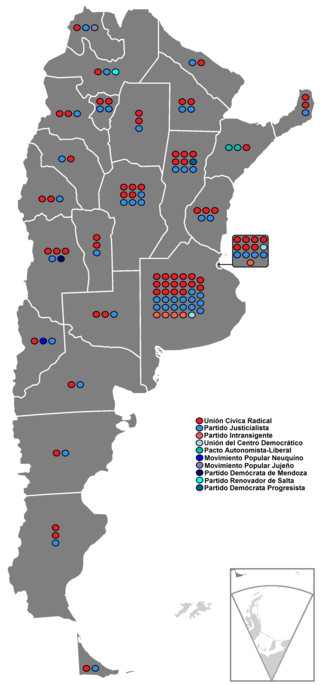
Raúl Ricardo Alfonsín was an Argentine lawyer and statesman who served as President of Argentina from 10 December 1983 to 8 July 1989. He was the first democratically elected president after more than seven years of military dictatorship, and is considered the "father of modern democracy in Argentina". Ideologically, he identified as a radical and a social democrat, serving as the leader of the Radical Civic Union from 1983 to 1991, 1993 to 1995, 1999 to 2001, with his political approach being known as "Alfonsinism".

Reynaldo Benito Antonio Bignone was an Argentine general who served as President of Argentina from 1 July 1982, to 10 December 1983, the last president to serve under the military dictatorship. In 2010, he was sentenced to 25 years in prison for his role in the kidnapping, torture, and murder of persons suspected of opposing the government during the Dirty War.
Argentina held national parliamentary elections on Sunday, 23 October 2005. For the purpose of these elections, each of the 23 provinces and the Autonomous City of Buenos Aires are considered electoral districts.

The Argentine general election of 1995 was held on 14 May. Voters chose both the President and their legislators and with a turnout of 82.1%.

Argentina held presidential elections on 24 October 1999. Legislative elections were held on four dates, 8 August, 12 September, 26 September and 24 October, though most polls took place on 24 October.

The Argentine general election of 1983 was held on 30 October and marked the return of constitutional rule following the self-styled National Reorganization Process dictatorship installed in 1976. Voters fully chose the president, governors, mayors, and their respective national, province and town legislators; with a turnout of 85.6%.

The Argentine general election of 1989 was held on 14 May 1989. Voters chose both the President and their legislators and with a turnout of 85.3%, Carlos Menem won the presidency, and the Peronist Justicialist Party won the control of both houses of Congress. This is the last presidential election the president was elected by the electoral college.

Rogelio Julio Frigerio was an Argentine economist, journalist and politician.

Argentina held national legislative elections on 26 October 1997. This election was the second time of the peronist Justicialist Party defeated since 1985, while Justicialist Party maintained control of the Congress.

The Argentine legislative elections of 1991 were held on four dates, 11 August, 8 September, 27 October and 1 December, though most polls took place on 8 September. Voters chose their legislators and governors and, with a turnout of 80%.
The Argentine legislative elections of 1993 were held on 3 October. Voters chose their legislators and, with a turnout of 80.3%.

The Integration and Development Movement is a developmentalist political party founded by Arturo Frondizi in Argentina. It is member of Juntos por el Cambio.

The Argentine legislative elections of 1985 were held on 3 November. Voters chose their legislators and, with a turnout of 83.8%.

Alejandro Armendáriz was an Argentine physician and politician.

Margarita Stolbizer is an Argentine lawyer and politician. Originally a member of the Radical Civic Union (UCR), she founded her own party, Generation for a National Encounter (GEN) in 2007. She has been a member of the Chamber of Deputies of Argentina on three occasions: from 1997 to 2005, from 2009 to 2017, and since 2021.

Argentina held national presidential and legislative elections on Sunday, 23 October 2011. Incumbent president Cristina Fernández de Kirchner of the Front for Victory won in a landslide, with 54.11% of votes against Hermes Binner of Broad Progressive Front, she also secured a second term in office after the Front for Victory won just over half of the seats in the National Congress.

Ricardo Gil Lavedra is an Argentine lawyer, magistrate, and politician. A member of the Radical Civic Union, Gil Lavedra served as Minister of Justice during the early presidency of Fernando de la Rúa, from 1999 to 2000. From 2009 to 2013, he was a member of the Argentine Chamber of Deputies elected in Buenos Aires.

Javier González Fraga is an Argentine economist and businessman. He served as President of the Central Bank of Argentina from 1989 to 1991, and was nominated as running-mate by Ricardo Alfonsín for his 2011 campaign for the Presidency.

Raúl Alfonsín was the president of Argentina from 1983 to 1989.

Fernando de la Rúa's tenure as president of Argentina began when he took office on 10 December 1999, and ended with his resignation on 21 December 2001 in the wake of the December 2001 crisis.



















